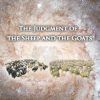Thoughtful people have long struggled in the face of the Christian doctrine of Heaven and Hell, causing them to consider the destiny of the countless millions of people who have never had the opportunity to hear about Jesus.
This question looms in the minds of many Christians, and the classic answer, at least from the Calvinist camp, makes God out to be a vindictive1vindictive — disposed to seek revenge; showing malicious ill will and a desire to hurt; motivated by spite. monster: all men are born totally depraved, worthy of eternal damnation regardless of how they live their lives or whether they have ever heard of Jesus Christ.
We utterly reject this misrepresentation of God’s justice and would like to set the record straight from the Holy Scriptures.
While it is not possible for a man to work his way to heaven, it is also not true that he is doomed to eternal death regardless of how he lives his life. What is the truth about man’s eternal destiny?
First of all, it is true that when Adam and Eve disobeyed God’s command in the Garden of Eden and ate the forbidden fruit, they incurred the sentence of death:
And the Lord God commanded the man, saying, “Of every tree of the garden you may freely eat; but of the tree of the knowledge of good and evil you shall not eat, for in the day that you eat of it you shall surely die.” (Genesis 2:16-17)
Their physical death was not immediate, but their spiritual death was, and their fallen condition was passed on to their offspring, as the record shows, “for all have sinned and fall short of the glory of God.”2Romans 3:23 Therefore, since “the wages of sin is death,”3Romans 6:23 then “it is appointed for men to die once, but after this the judgment.”4Hebrews 9:27
This much is clear to most Christians, but what happens after the judgment? This is the part that is widely misunderstood. But remember, the Bible says, “It is appointed for men to die once…” It doesn’t say twice. Yet there is a second death:
But for the cowardly and unbelieving and abominable and murderers and immoral persons and sorcerers and idolaters and all liars, their part will be in the lake that burns with fire and brimstone, which is the second death.
(Revelation 21:8)
This verse identifies people of a certain character whose destiny will be a second and unending death in the lake of fire. But what about those who are not of that character? That is why there must be a judgment:
Then I saw a great white throne and Him who sat on it, from whose face the earth and the heaven fled away. And there was found no place for them. And I saw the dead, small and great, standing before God, and books were opened. And another book was opened, which is the Book of Life. And the dead were judged according to their works, by the things which were written in the books. The sea gave up the dead who were in it, and Death and Hades delivered up the dead who were in them. And they were judged, each one according to his works. Then Death and Hades were cast into the lake of fire. This is the second death. And anyone not found written in the Book of Life was cast into the lake of fire.
(Revelation 20:11-15)
Now some will say this judgment is merely a formality — not a judgment at all, but a sentencing. They will say that no one’s name was found written in the Book of Life because they didn’t believe in Jesus,5The “cowardly and unbelieving” in Revelation 21:8 are those who rejected the gospel as John 3:18,36 describes, not those who never heard the gospel. But some Christians will say there is no excuse, because if anyone were really sincere, God would send a missionary to him, even in the remotest corner of China. Rightly did our Master say of such self-righteous judges: “Woe to you, for you travel over land and sea to win one convert, and when he is won, you make him twice as much a son of hell as yourselves!” (Matthew 23:15) so all were cast into the lake of fire. They fail to distinguish between this “Book of Life” for the nations and the “Lamb’s Book of Life” for the holy nation. They suppose that God raises men from the first death to stand before Him so that He can gloat at them while He pretends to look up their name in the Book of Life, knowing it will not be there. Then He callously casts them into the lake of fire. But this is not God’s character.
Abraham, the father of our faith, when he appealed to God to spare the few righteous in Sodom, knew something about the character of God that escapes many Christians today:
“Far be it from you to slay the righteous with the wicked, treating the righteous and the wicked alike… Far be it from you! Will not the judge of all the earth do what is right?”
(Genesis 18:25)
Of course Abraham was especially thinking of his nephew Lot, and God heard his plea and rescued Lot and his daughters. Although he was not included in the covenant with Abraham, Lot is described as being righteous.62 Peter 2:7-8 And while this passage does not speak of Lot’s eternal destiny, but merely his temporal deliverance from the destruction of Sodom, yet it speaks of God’s character as understood by Abraham, the friend of God.72 Chronicles 20:7; Isaiah 41:8; James 2:23; Revelation 22:3-5; Genesis 3:16-19
We stand with Abraham, knowing that God will righteously judge all people according to their works, and not just throw them all willy-nilly into the lake of fire. Those who are not worthy of the second death will be granted a second life, and it is over them that Messiah and His Bride (those who have truly believed in Him) will rule throughout eternity.8Revelation 21:2-4,24-26; Isaiah 9:7; Psalm 102;25-28
Now let’s take a closer look at the basis of this judgment:
“Then the Lord God said, ‘Behold, the man has become like one of Us, knowing good and evil…’”
(Genesis 3:22)
After Adam ate from the tree of the knowledge of good and evil, he would have to live by that knowledge, choosing to do the good and not to do the evil. Even though fallen man could not do this perfectly, God still held him accountable to exercise his will to overcome the temptation to do evil, just as He told Cain:
“If you do what is right, will you not be accepted? But if you do not do what is right, sin is crouching at your door; it desires to have you, but you must master it.”
(Genesis 4:7)
Of course, Cain did not master it, but all are not like Cain. All do not murder. All are not immoral. Many strive to do the good they know in their conscience, and are grieved when they fail, and do everything possible to make restitution when they do wrong. These have a natural righteousness of their own, a natural faith or persuasion that God is good and that He will judge all men justly. They value the dignity of life. They recognize the image of the Creator in His creation. They work hard and are faithful in their marriages.9Genesis 3:16-19, 9:1-7 They labor to put their values into their children. They bear suffering without growing bitter. They try to keep a good conscience. And God does not despise their efforts.
True, all men sin and fall short of the glory of God, but not all fall utterly short. Glory means weight or value. Adam, before he fell, had great value, having been made in God’s image. When he fell, God’s image in him was marred, but not obliterated. This is very clear from what God said after Adam’s fall, and in fact even after the Flood:
“Whoever sheds man’s blood, by man his blood shall be shed; for in the image of God He made man. And you, be fruitful and multiply; abound on the earth and multiply in it.”
(Genesis 9:6-7)
Man still bears God’s image and has great value in God’s eyes, as He requires capital punishment for any who would fail to respect His image in his fellow man to the point of committing murder. But beyond that, God commissioned Noah and his sons after the flood to be fruitful and multiply abundantly on the earth. If man was now worthless and totally depraved, why would a loving Creator want to fill the earth with such creatures?
So fallen man still bears the image of his Creator and retains intrinsic10intrinsic — belonging to a thing by its very nature. worth to the degree that he lives by the knowledge of good and evil, inherent11inherent — existing as an essential constituent or characteristic; in the nature of something. in his conscience. Even though he has an inborn inclination to sin, he is able and accountable to do the good that he knows in his conscience and to keep himself from the kinds of sins that would make him worthy of the second death.12Revelation 21:8; 22:15; Romans 1:28-32
Yet regardless of how carefully a man lives by his conscience, he will not do so perfectly, for he is a fallen creature. He will sin, and his sin must be paid for, as it is an inviolable law that the wages of sin is death. A man’s good deeds cannot save him from the consequences of his sin — the first death. His natural righteousness cannot restore him to fellowship with God, nor make him worthy of ruling and reigning with Christ. All of his good deeds are of no more value than filthy rags13Isaiah 64:6; Romans 10:13-17; Romans 2:14-16; Matthew 18:34; Acts 2:24; 1 Corinthians 15:55-56 for obtaining the righteousness of God, which can only be imputed to a man on the basis of faith, which comes from hearing the word of Christ from someone sent to preach the Good News.14Romans 10:15
So whoever dies without Christ must go to the first death to pay the wages of his own sin, since he does not have a sacrifice for his sins. How then does he pay these wages? It is according to how much worth remains in him, how much integrity and courage he has to face the truth about himself. For in death he is finally alone with his conscience, forced to face his sin, with nowhere to hide and nothing to distract his mind from the awareness of his own guilt. Every evil deed, every base thought, every selfish motive comes out of hiding to torture him. Like a worm burrowing into the recesses of his memory, eating away at his every excuse, so is the path of his thoughts as his conscience fully awakens. The unquenchable fire of his self-inquisition leaves him either weeping in remorse or gnashing his teeth as he resists the truth about himself.15Matthew 13:42 & 50, 22:13; Luke 13:28, 16:23 & 28
Those who resist the truth, reasoning away their guilt even in death, prove themselves unable to pay sin’s wages. They are the same in death as they were in life — set in their ways, their hearts fully hardened by the deceitfulness of sin. A second death awaits them, where they will gnash their teeth eternally. There is a mystery here. King David wrote,
“From heaven the Lord looks down and sees all mankind; from His dwelling place He watches all who live on earth —
He who forms the hearts of all, who considers everything they do.”
(Psalm 33:13-15)
The Creator of man forms, fashions, or molds each man’s heart according to what he does or gives himself to. Eventually the heart, like clay, becomes “set” in its way, and so that person’s character will remain eternally16Revelation 22:11 — some bent towards evil, and some towards good.
The latter, in death, will weep in remorse, accepting the full responsibility for their sins rather than blaming them on others. They are the ones who are able to pay sin’s wages. When they are resurrected to stand judgment, they will have fully received the discipline of death and will find mercy and not condemnation. This mercy and comfort will come at the hands of the bride of Messiah, who, according to the Apostle Paul171 Corinthians 6:2, will be judging the nations on God’s behalf. They will wipe away the tears of those who were judged not worthy of the second death:
“Then I saw the holy city, New Jerusalem, coming down out of heaven from God, prepared as a bride adorned for her husband. And I heard a loud voice from heaven saying, ‘Behold, the tabernacle of God is with men, and He will dwell with them, and they shall be His people. God Himself will be with them and be their God. And God will wipe away every tear from their eyes; there shall be no more death, nor sorrow, nor crying. There shall be no more pain, for the former things have passed away.’” (Revelation 21:2-4)
The “tabernacle” or “dwelling place” of God is the bride or wife of Messiah,18Revelation 21:9-14 who will dwell with men — the resurrected righteous people of the nations. That is how God Himself will be with them — through the wife of Messiah.19Revelation 21:2-4 Redeemed Man will rule with Messiah over Restored Man,20Revelation 11:15, 21:2-4,24-26; Isaiah 9:7; Psalm 102;25-28 and the original commission given to Adam will be restored to him, once sin and death and the evil one himself are no more:21Genesis 1:28, Isaiah 55:10-11, 1 Corintians 15:26, Revelation 20:10 & 14
“Be fruitful and multiply; fill the earth and subdue it; have dominion over the fish of the sea, over the birds of the air, and over every living thing that moves on the earth.” (Genesis 1:28)
Amazingly, in Psalm 8, King David prophesied that man (both the redeemed and restored man) would rule over all the works of God’s hands, including all the galaxies of planets. Surely without death, restored man will quickly fill up the earth and go on to colonize the universe with restored humanity, under the ever-increasing government of God 22Revelation 21:24, NKJV; Isaiah 9:6-7, Daniel 7:27 RSV — the redeemed corporate23corporate — composed of individuals acting together as one entity. man, which is the wife 24Revelation 21:9,12 of Messiah.
So we hope that you can see that there is a lot more in God’s heart towards His highest creation, mankind, than to throw countless millions into the lake of fire for the crime of not having been born in the right place and time to hear the true gospel. If you are interested in reading more about man’s eternal destiny, please continue on our web site and contact us. Or better yet, just come and visit any one of our cafe’s or communities and we will be happy to talk with you!
Scriptural References and Other Footnotes






